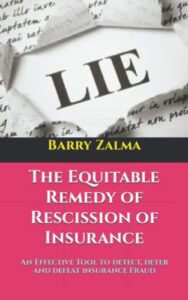The Equitable Remedy of Rescission of Insurance:

On Today, the Summer Solstice, The Equitable Remedy is Now Available at Amazon.com from Barry Zalma & the Insurance Claims Library
Rescission is an equitable remedy first created in the ecclesiastical courts of Elizabethan England.
When the United States was conceived in 1776 the founders were concerned with protecting their rights under British common law.
Common Law is a form of law developed by judges through tribunals and decisions of courts rather than executive branch action and legislative statutes.
Following the common law tradition, legal principles were referred to courts of equity to “mitigate the rigor” of the common law.
The new United States of America adopted British common law as the law once the U.S. Constitution was adopted in 1789. British common law was only modified by the limitations placed on the central government by the Constitution.
 The viability and ability to enforce contracts was recognized as essential to commerce. Courts of law, following the British Common Law, were charged with enforcing legitimate contracts and rendering money judgments against the party who breached the contract.
The viability and ability to enforce contracts was recognized as essential to commerce. Courts of law, following the British Common Law, were charged with enforcing legitimate contracts and rendering money judgments against the party who breached the contract.
It became clear, however, that some contract disputes cannot be resolved with a money judgment. Rather, it needed the assistance of the courts of equity whose judges, in the Elizabethan era were presided over by priests who were believed to be better able to render fair judgments.
The term “equity” is associated with notions of fairness, morality and justice. It is an ethical jurisdiction. On a more legalistic level, however, “equity” is the branch of law that was administered in the Court of Chancery prior to the Judicature Acts 1873 and 1875.
This was a jurisdiction evolved to achieve justice and to overcome the rigorous and deficiencies of the common-law. Although application of conscience pervades this aspect of the law, equity never bestowed an unfettered jurisdiction on the Court of Chancery to do what was fair in the settlement of a dispute. Embodying aspects of ecclesiastical law and Roman law, equity developed and gradually emerged as a distinct body of law.
It was not until 1875 that equity was practiced in the common law courts. The existence of a dual system entailed that, for example, when a defendant had an equitable defense to a common law action, he would have to go to the Court of Chancery to obtain an injunction to suspend the proceedings in common-law court. He would then begin a fresh action for relief in the Court of Chancery. Facing duality persisted until the Judicature Acts which created the Supreme Court of Judicature and allowed all courts to exercise both a common law and equitable jurisdiction.

The courts of equity were charged with, among other things, protecting contracting parties from mistake, fraud, misrepresentation and concealment where no damages were involved. It was the obligation of the courts of equity to reach a result that was fair to all of the parties to the contract. The founders of the United States, and the British common law, concluded that equity required that enforcing a contract based on mistake, fraud, misrepresentation or concealment would not be fair.
A court of equity is a court which can apply equitable remedies to disputes. These courts operate within the legal system, but rather than focusing on the application of law, they look at cases and determine outcomes based on fairness. They can be found in many regions of the world. In modern usage in the United States trial courts are empowered to handle both legal and equitable remedies.
Available as a kindle book here. Available as a paperback here.
Available as a hardcover here.
See more insurance law and claims books from the Insurance Claims Library here.

(c) 2022 Barry Zalma & ClaimSchool, Inc.
Barry Zalma, Esq., CFE, now limits his practice to service as an insurance consultant specializing in insurance coverage, insurance claims handling, insurance bad faith and insurance fraud almost equally for insurers and policyholders. He practiced law in California for more than 44 years as an insurance coverage and claims handling lawyer and more than 54 years in the insurance business. He is available at http://www.zalma.com and zalma@zalma.com.
Subscribe to Zalma on Insurance at locals.com https://zalmaoninsurance.locals.com/subscribe.
Subscribe to Excellence in Claims Handling at https://barryzalma.substack.com/welcome.
Write to Mr. Zalma at zalma@zalma.com; http://www.zalma.com; http://zalma.com/blog; daily articles are published at https://zalma.substack.com. Go to the podcast Zalma On Insurance at https://anchor.fm/barry-zalma; Follow Mr. Zalma on Twitter at https://twitter.com/bzalma; Go to Barry Zalma videos at Rumble.com at https://rumble.com/c/c-262921; Go to Barry Zalma on YouTube- https://www.youtube.com/channel/UCysiZklEtxZsSF9DfC0Expg; Go to the Insurance Claims Library – https://zalma.com/blog/insurance-claims-library/
Like this:
Loading…
Related
About Barry Zalma
An insurance coverage and claims handling author, consultant and expert witness with more than 48 years of practical and court room experience.







